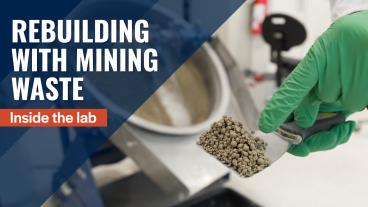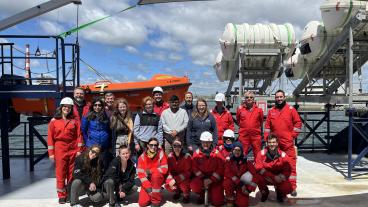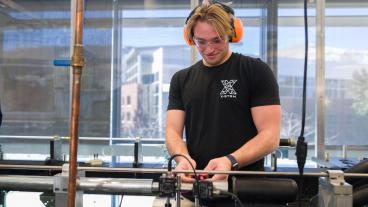A three-day NSF-sponsored workshop will bring to Mines 20 of the world’s top scholars focused on the societal aspects of mining and other extractive processes.
“STS Underground: Investigating the Technoscientific Worlds of Mining and Subterranean Extraction” will take place February 5 to 7, 2017. The workshop encourages a research approach that is often referred to as Science and Technology Studies, or Science, Technology, and Society (STS).
“STS sheds light on how mining, energy and other extractive processes are not just technical, but sociotechnical practices that have everything to do with questions of knowledge, power and expertise,” said Jessica Smith, Hennebach Assistant Professor of Energy Policy in Liberal Arts and International Studies. Smith is cohosting the conference with Ropali Phadke of Macalester College and Abby Kinchy of Renesselar Polytechnic Institute. “Industry leaders have learned that to be successful and sustainable, they need to be proactive in engaging these sorts of sociotechnical questions.”
The conference is the first one in STS to focus specifically on extractive activities. “The existing social science scholarship on mining and extraction comes largely from anthropology and geography, especially in terms of the consequences for vulnerable communities. Yet these fields remain largely distinct from STS and rarely engages practitioners, such as scientists and engineers,” explained Phadke.
Workshop participants who are interdisciplinary humanities and social sciences scholars will have the opportunity to engage with scientists and engineers who work in those fields. They will also have an opportunity to tour the university’s Edgar Experimental Mine. Organizers say STS is well positioned to make an impact in these industries, opening up crucial questions about the technologies, practices and forms of knowledge related to subterranean extractive practices.
“We’re proud that Mines is playing a role in bringing these industries from the periphery of this field to the center of it,” said Smith.
While the majority of the three-day event is closed to the public in order to workshop papers in a forthcoming book, there are two public events on February 6: a panel discussion with invited guest scholars, who will synthesize and comment on the themes of the workshop, and a keynote address from renowned historian Gabrielle Hecht, an internationally recognized expert on nuclear energy policy and uranium mining.
The panel will take place 4 to 5:30 p.m. in the Ben Parker Student Center, Ballrooms A and B, with speakers Anthony Bebbington of Clark University, Trevor Birkenholtz of the University of Illinois, Elizbeth Ferry of Brandeis Unvieristy and Phadke. More information about each of the speakers can be found here.
A reception will follow from 5:30 to 6 p.m., where posters showcasing Mines students’ research engaging with the social responsibility dimensions of mining, oil and gas, groundwater and geothermal projects will be on display.
The keynote address will be held immediately after at 6 p.m. Hecht will present “Residual Governance: Mining Afterlives and Molecular Colonialism, seen from an African Anthropocene.”
“It’s exciting to see Mines at the forefront of defining the underground as a vibrant specialty inside of STS,” said Smith, “and the workshop is advancing our efforts in the Humanitarian Engineering program to grow research and teaching on social responsibility on campus.”
This workshop is being made possible by NSF Award 16322651.
Contact:
Agata Bogucka, Communications Manager, College of Earth Resource Sciences & Engineering | 303-384-2657 | abogucka@mines.edu
Mark Ramirez, Managing Editor, Communications and Marketing | 303-273-3088 | ramirez@mines.edu



